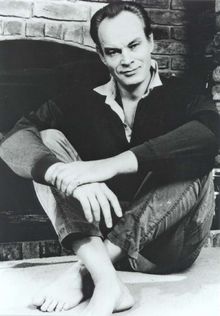
Andrzej Sapkowski is a Polish fantasy writer, essayist, translator and a trained economist. He is best known for his six-volume series of books The Witcher, which revolves around the eponymous "witcher," a monster-hunter, Geralt of Rivia. It began with the publication of Sword of Destiny (1992), and was completed with the publication of standalone prequel novel Season of Storms (2013). The saga has been popularized through television, stage, comic books, video games and translated into 37 languages making him the second most-translated Polish science fiction and fantasy writer after Stanisław Lem.

David Andrew Gemmell was a British author of heroic fantasy, best known for his debut novel, Legend. A former journalist and newspaper editor, Gemmell had his first work of fiction published in 1984. He went on to write over thirty novels. Gemmell's works display violence, yet also explore themes of honour, loyalty and redemption. There is always a strong heroic theme but nearly always the heroes are flawed in some way. With over one million copies sold, his work continues to sell worldwide.
The Edge Chronicles is a children's fantasy novel series written by Paul Stewart and Chris Riddell. It consists of four trilogies, plus four additional books, and other books related to the universe. The series was originally published by Doubleday, a subsidiary of Penguin Random House, and has sold more than three million copies, according to its publisher.

Robin McKinley is an American author best known for her fantasy novels and fairy tale retellings. Her 1984 novel The Hero and the Crown won the Newbery Medal as the year's best new American children's book. In 2022, the Science Fiction and Fantasy Writers Association named her the 39th Damon Knight Memorial Grand Master in recognition of her significant contributions to the literature of science fiction and fantasy.

Jonathan Anthony Stroud is a British writer of fantasy fiction, best known for the Bartimaeus young adult sequence and Lockwood & Co. children's series. His books are typically set in an alternative history London with fantasy elements, and have received note for his satire, and use of magic to reflect themes of class struggle. The Bartimaeus sequence is the recipient of the Grand Prix de l'Imaginaire and Mythopoeic Fantasy Awards. Stroud's works have also been featured on ALA Notable lists of books for children and young adults. In 2020, Netflix announced a TV series based on Lockwood & Co., with filming initiated in July 2021.
Paul Kearney is a Northern Irish fantasy author. He is noted for his work in the epic fantasy subgenre and his work has been compared to that of David Gemmell.

Grey Griffins is a children's novel series written by the American authors Derek Benz and J. S. Lewis in collaboration.
Stan Nicholls is a British author and journalist, working full-time since 1981. He is the author of many novels and short stories but is best known for the Orcs: First Blood series.

Shadows Return is a fantasy novel by American writer Lynn Flewelling, the fourth novel in her Nightrunner series. It is preceded by Luck in the Shadows, Stalking Darkness and Traitor's Moon, and is followed by The White Road.

Brent Weeks is an American fantasy writer. His debut novel, The Way of Shadows, was a New York Times best seller in April 2009. Each of the five books in his Lightbringer series made the NYT list as well, starting with The Black Prism in 2010. He lives and works near Portland, Oregon with his wife, Kristi, and their two daughters.
Mark Lawrence is an American-British novelist who wrote The Broken Empire trilogy. In 2014, Lawrence won the David Gemmell Legend Award for best novel for Emperor of Thorns. He operates the annual Self-Published Fantasy Blog-Off.

Wolf in Shadow is a 1987 post-apocalyptic heroic fantasy novel by British author David Gemmell. It is similar to Gemmell's first book Legend in that Legend arose from Gemmell's own illness with cancer, and Wolf in Shadow was written while he dealt with his mother's cancer and subsequent death.
The David Gemmell Awards for Fantasy, established in memory of David Gemmell, were awarded from 2009 to 2018. In 2009, only the Legend Award for best fantasy novel was awarded. Beginning in 2010 the Morningstar Award for Best Fantasy Newcomer and the Ravenheart Award for Best Fantasy Cover Art were added. The award was closed in 2019.

The Broken Empire Trilogy is a trilogy of fantasy novels written by American-British author Mark Lawrence. The first volume, Prince of Thorns, was published on August 2, 2011. The second, King of Thorns, was published on August 7, 2012. The third and final volume, Emperor of Thorns, was published on August 6, 2013.

Anthony Ryan is a Scottish writer of fantasy and science fiction, best known for his books about Vaelin Al Sorna, which started in 2013 with Blood Song. He worked as a full-time researcher before switching to full-time writing. He currently lives in London, England. He has a degree in Medieval History.
The Powder Magetrilogy is a series of epic fantasy novels written by American author Brian McClellan. It consists of the novels Promise of Blood (2013), The Crimson Campaign (2014) and The Autumn Republic (2015). In 2014, Promise of Blood received the Morningstar Award for Best Fantasy Newcomer. Several short stories and novellas set in the world of The Powder Mage trilogy have been published, as well as an additional trilogy called Gods of Blood and Powder.

Leigh Bardugo is an American fantasy author. She is best known for her young adult Grishaverse novels, which include the Shadow and Bone trilogy, and the Six of Crows and King of Scars duologies. She also received acclaim for her paranormal fantasy adult debut, Ninth House. The Shadow and Bone and Six of Crows series have been adapted into Shadow and Bone by Netflix and Ninth House will be adapted by Amazon Studios; Bardugo is an executive producer on both works.

C. J. Redwine is an American writer of science fiction and fantasy. She is the New York Times bestselling author of the Defiance Trilogy, the Ravenspire series, the Rise of the Vicious Princess duology, a nonfiction resource on query writing, and an Audible original titled The Disappearance of Emily Downs.












